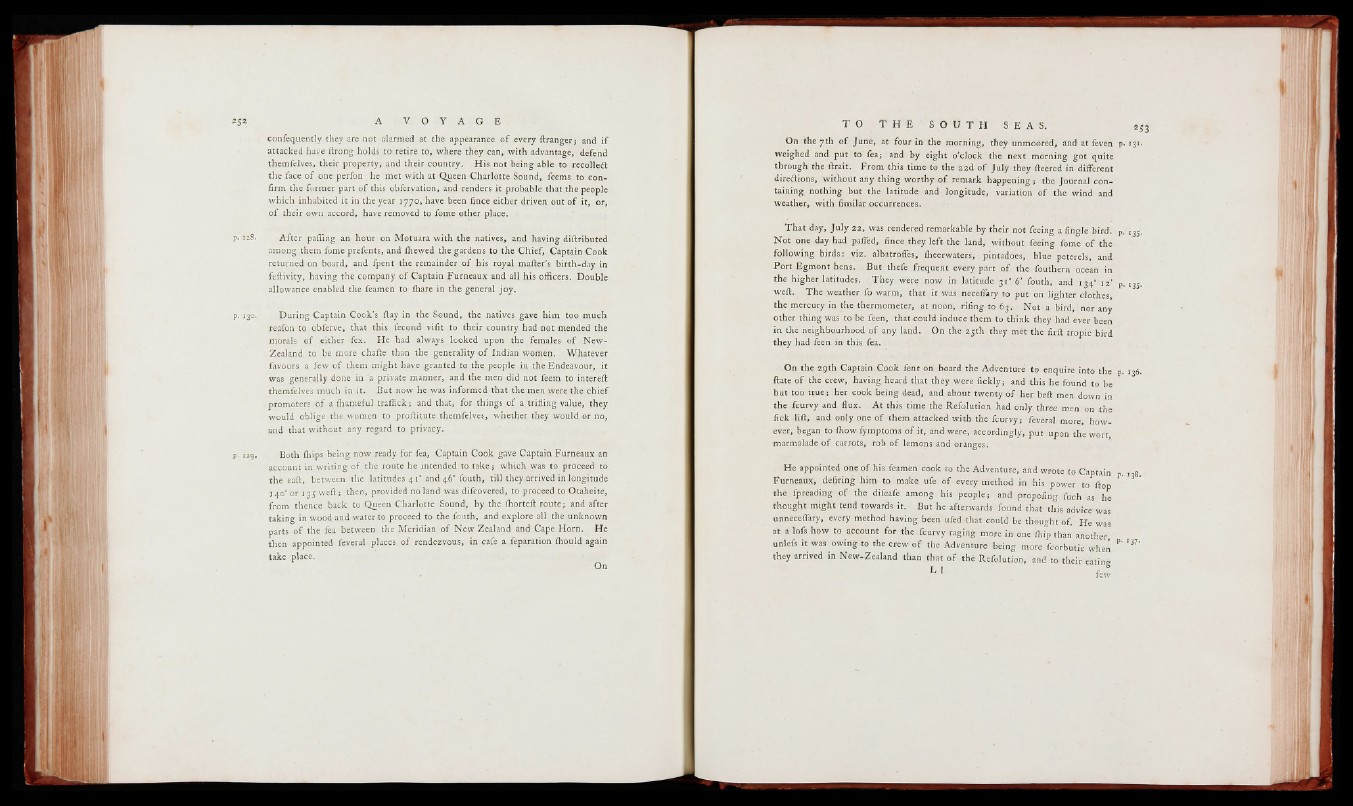
confequently they are not alarmed at the appearance of every ftranger; and if
attacked have ftrong holds to retire to, where they can, with advantage, defend
themfelves, their property, and their country. His not being able to recolledt
the face of one perfon he met with at Queen Charlotte Sound, feems to confirm
the former part of this obfervation, and renders it probable that the people
which inhabited it in the year 1770, have been fince either driven out of it, or,
of their own accord, have removed to fome other place. -
p. 128. After paifing an hour on Motuara with the natives, and having diftributed
among them fome prefents, and ihewed the gardens to the Chief, Captain Cook
returned on board, and fpent the remainder of his royal mailer’s birth-day in
feflivity, having the company of Captain Furneaux and all his officers. Double
allowance enabled the feamen to ihare in the general joy.
p. 130. During Captain Cook’s ilay in the Sound, the natives gave him too much
reafon to obferve, that this fecond vifit to their country had not mended the
morals of either fex. He had always looked upon the females of New-
Zealand to be more chaile than the generality of Indian women. Whatever
favours a few of them might have granted to the people in the Endeavour, it
was generally done in a private manner, and the men did not feem tointereft
themfelves much in it. But now he was informed that the men were the chief
promoters of a ihameful traffick; and that, for things of a trifling value, they
would oblige the women to proftitute themfelves, whether they would or no,
and that without any regard to privacy.
p. 129. Both (hips being now ready for fea, Captain Cook gave Captain Furneaux an
account in writing of the route he intended to take ; which was to proceed to
the eaft, between the latitudes 410 and 46° fouth, till they arrived in longitude
140° or 135 weft; then, provided no land was difcovered, to proceed to Otaheite,
from thence back to Queen Charlotte Sound, by the ihorteft route;, and after
taking in wood and water to proceed to the fouth, and explore all the unknown
parts of the fea between the Meridian of New Zealand and Cape Horn. He
then appointed feveral places of rendezvous, in cafe a feparation ihould again
take place.
On the 7th of June, at four in the morning, they unmoored, and at feven p- 131*
weighed and put to fea; and by eight o’clock the next morning got quite
through the ftrait. From this time to the 2ad of July they fteered in different
directions, without any thing worthy of remark happening ; the Journal containing
nothing but the latitude and .longitude, variation of the wind and
weather, with fimilar occurrences.
That day, July 22, was rendered remarkable by their not feeing a fihgle bird. p. 135.
Not one day had paffed, fince they left the land, without feeing fome of the
following birds : viz. albatrofles, fheerwaters, pintadoes, blue peterels, and
Port Egmont hens. But thefe frequent every part of the fouthern ocean in
the higher latitudes* , They were now in latitude 310 6’ fouth, and 1340 12’ p. 135.
weft. The weather fo warm, that it was; neceffary to put on lighter clothes
the mercury in the thermometer, at noon, rifing to 63. Not a bird, nor any
other thing was to be feen, that could induce them to think they had ever beeii
in the neighbourhood of any land. On the 25th they met the firft tropic bird
they had feen in this, fea.
On the 29th Captain Cook fent on board the Adventure to enquire into the p. 136.
ftate of the crew, having heard that they were fickly; and this he found to be
but too true; her cook being dead, and about twenty o f her beft men down in
the fcurvy and flux. At this time the Refolution had only three men on the
fick lift, and only one of them attacked with the fcurvy; feveral more, however,
began to ihow fymptoms of it, and were, accordingly, put upon the wort
marmalade of carrots, rob of lemons and oranges.
He appointed one o f his feamen cook to the Adventure, and wrote to Captain P 1 8
Furneaux, defiring him tp make ufe of every method in his power to flop
the fpreading of the difeafe among his people; and propofing fuch as he
thought might tend towards it. But he afterwards found that this advice was
unnecefiary, every method having been ufed-that could be thought of. He was
at a lofs how to account for the fcurvy raging more in one ftiip than another,
unlefs it was owing to the crew of the Adventure being more fcorbutie when P' ^
they arrived in New-Zealand than that o f the Refolution, and to their eating
L 1 few